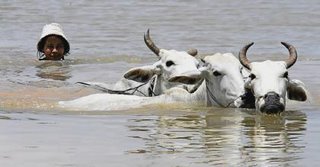JOEL BRINKLEY: The world leader in corruption is - Cambodia
The World Leader in Corruption Is - Cambodia
August 21, 2008By JOEL BRINKLEY (McClatchy-Tribune News Service)
The Olympian
PHNOM PENH, Cambodia — Hun Chea, a nephew of Cambodia's prime minster, was speeding along a busy downtown street a few days ago when he ran down a man on a motorbike.
Phnom Penh's streets are teeming with motorbikes, hundreds of them, criss-crossing busy traffic without seeming to look or care where they are going. Collisions are inevitable. But that's not the point of this story.
Hun was tearing down the street at high speed when he hit the biker, witnesses reported, and his car ripped off an arm and a leg. The biker, Sam Sabo, was killed. Hun began to drive off, but running over the motorbike had shredded a tire. He had to pull over, so there he sat in his big black Cadillac Escalade SUV.
Now, listen to how the Phnom Penh Post newspaper described the events that followed.
"Numerous traffic police were seen avoiding the accident scene, but armed military police arrived. They removed the SUV's license plates and comforted Hun Chea" while Sam Sabo lay bleeding to death in the street. A military policeman was overheard telling Hun: "'Don't worry. It wasn't your mistake. It was the motorbike driver's mistake.'" A few days later, Hun gave the dead man's family $4,000 in hush money, the paper reported. Case closed.
It's no secret that Cambodia is thoroughly corrupt. As an indirect result, the rich and the powerful can commit, well, murder and face few if any repercussions.
A primary rule of foreign correspondence is to avoid applying the values of your own country on the nation you are covering. But then, some events appear so outrageous that the rule does not apply. Police actually removed the car's license plates, to conceal the driver's identity? So I asked Khieu Kanarith, Cambodia's information minister, about the case. He fumbled about for a moment and then explained, "I understand he had his wife in the car, and I don't think he was paying attention to what he was doing." OK, but the police removed the license plates? Khieu had to think about that for a moment but finally managed to say, "You try to cover the plates because it's harder to sell a car if it's been in an accident." As a reporter, sometimes it's hard to keep a straight face. But then, being Cambodia's information minister is a tough job.
Later I asked Joseph Mussomeli, the U.S. ambassador, about this, and he shook his head.
"This goes to the whole culture of impunity here. Who you are, who you know, is more important than following the law. And the police are too intimidated, too deferential, to the wealthy and powerful." Why else would the traffic police assertively avoid the scene of the accident, even with a dying man lying in the street? They knew full well that the owner of a Cadillac Escalade SUV in this exceedingly poor country is quite likely to be well connected.
Impunity is a word that comes up over and over in Cambodia. Last month, two men speeding by on a motorbike shot and killed Khim Sambor and his 21-year-old son as they walked down the street. Khim was a reporter for Khmer Conscience, an opposition newspaper, and not surprisingly the paper had been writing critically about the government.
No one has been arrested. That is true for dozens of apparent contract killings in recent years just like that one. No one has proved that government officials are behind them. But then, why else would the police make no effort to solve any of these crimes? Cambodia has come a long way in the last several years. Phnom Penh is teeming with tourists. The economy is growing. The nation has been stable for more than a decade now, which is no small accomplishment.
Over the years, I have worked in many corrupt states - Iraq, Sudan, Afghanistan, among others. But in none of them is the corruption so pervasive, even pandemic. Prime Minister Hun Sen just won re-election to a new five-year term. For a decade, the United States and many other countries have been pressing him to pass a comprehensive anti-corruption law. Hun continually promises but never delivers.
Cambodians deserve better. If Cambodia hopes to join the ranks of the world's prosperous and respected nations, it must enact - and enforce - an anti-corruption law. With that, in time, the shiny mantle of impunity resting softly on the shoulders of the rich and well-connected will begin to fall away.
ABOUT THE WRITER
Joel Brinkley is a former Pulitzer Prize-winning foreign correspondent for The New York Times and now a professor of journalism at Stanford University. Readers may send him e-mail at: brinkley@foreign-matters.com
» Read more!





